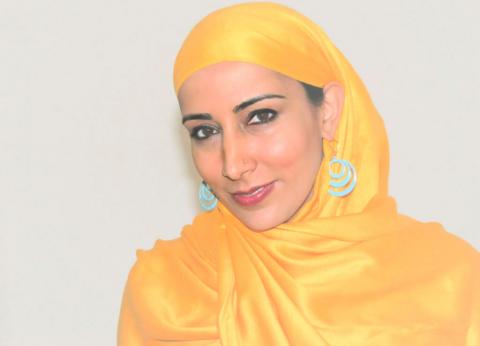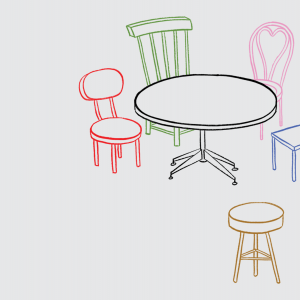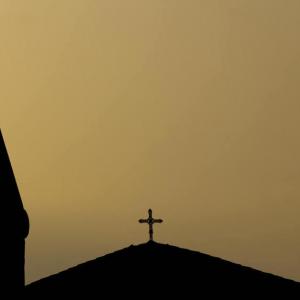
Najeeba Syeed has been recognized for her work in interfaith peacebuilding, restorative justice, and religious leadership in Muslim contexts. She is co-editor of a forthcoming volume on interreligious learning and theological education.
Posts By This Author
Who Is Invited to the Table?
Interfaith dialogue must include Indigenous belief systems too.
IN MY OWN interreligious instruction, I have become aware of the lack of discussion of Indigenous traditions. The very way knowledge is conceived of is at play here. Margaret Kovach articulates an Indigenous epistemology in her essay “Emerging from the Margins” as “fluid, non-linear, and relational. Knowledge is transmitted through stories that shape shift in relation to the wisdom of the storyteller at the time of the telling.”
As I have engaged Indigenous communities and scholarly voices in my work, I have sought to:
Bust up the category of religion. By this I mean I try to interrogate how interreligious encounters define religion and who is invited to the table, or what parts of a person we invite.
Since I teach at a Christian seminary, religion as defined by doctrinal and scriptural sources takes precedence. I found that many of my Christian students—for instance, those from Tonga—had a deep connection to Indigenous practices woven into their identity. But at seminary this aspect was reduced to “culture” and not given a place at the table. I learned to ask students to self-identify and opened the space to recognize that all forms of their spiritual practice were valid sources of scholarship. They were not asked to cancel or erase parts of their spiritual practice that were considered by others as less important.
Teach People To Work Through Differences, Not Ignore Them
Why interfaith engagement must move beyond bridge-building.
FOR MANY INVOLVED in interfaith engagement, the goal is to seek common ground and values. The assumption is that differences are the source of conflict and peace is predicated on seeing each other as having more in common than different. This is a framing I hear again and again. It is certainly a necessary first step for communities that have narrow ranges of engagement with one another. For instance, it is powerful to watch students in my interfaith classes at Christian seminaries recognize how Islam and Christianity share a reverence for Christ.
But there are reasons we need to move beyond this mere appreciation of commonalities between religious traditions as the foundation for interreligious engagement.
Episodic empathy. Students and community leaders often develop a profound empathy when they engage with another tradition. However, if we don’t teach tools for navigating difference between communities, the empathy can become narrowly tied to the limited episodes of encounter, which are often facilitated by third parties. Does this empathy move from an affect of appreciation in that moment into an operationalized form of engagement across difference? When a crisis occurs and there is a rise in hatred, does the mere “common ground” approach promote behavior of deep allyship for when a community is targeted for hate and violence?
The Hypocrisy of Religious Freedom and Refugee Limits
What message is the U.S. sending by defying the basic principle of supporting those who face serious persecution based on their faith?
AMERICA'S OPENNESS TO refugees has been a distinct feature of our country from its foundation. Our nation was established by communities facing discrimination elsewhere for their religious practices. In the periods when the country was not open to refugees and asylum seekers, such as during the Holocaust, it later became clear that we were on the wrong side of history.
The Trump administration announced this fall an annual admissions ceiling of 18,000 refugees for the next fiscal year, its third straight year of drastic reductions and a historic low. By comparison, almost 85,000 refugees were admitted in President Obama’s last year in office. Trump’s actions come at a time when the number of people fleeing conflict around the world is the highest since World War II.
Faith-based organizations in the United States have been at the forefront of refugee resettlement. The Trump administration decision threatens the already precarious structures around resettlement, which are largely religiously based. For many, the scriptural obligation to care for the stranger is a core religious belief. By having this capacity for service undercut, in many ways the faithful—across the spectrum from conservative to progressive—are unable to fulfill their religious obligations for care. The administration’s refusal to engage the many faith-based leaders and organizations who called for more, not less, openness to welcoming refugees decries its alleged commitment to religious freedom.
When Democracy Is Threatened, Seek Interfaith Coalitions
Religious pluralism can deepen solutions and build partnerships for justice.
IN MY TEACHING, I seek to educate students toward a robust democracy. Religious education is so often engaged with abstract concepts such as “peace” and “justice” without considering how to put these ideas into daily action. What does religious pluralism in the real world look like? How do we prepare clergy and community to face the urgent issues of our time, which are sometimes caused by religion? How can interfaith solidarity deepen solutions and build durable partnerships that will benefit all creation, especially in times of state violence?
The starting point of many theologies of religious pluralism is the notion of salvation and how a particular tradition views the “afterlife.” This paradigm, not surprising, is often future-oriented; it is hard to translate into behaviors that are inclusive not just at the belief level but also in the lived religion of individuals, communities, and institutions.
From Theologies of Tolerance to Active Strategies for Peace
We need interreligious education.
IN THE WAKE of the terrorist attacks on two mosques in Christchurch, New Zealand, earlier this year, Prime Minister Jacinda Ardern seamlessly incorporated Muslim rituals into the public rites of grieving. Her response to the attacks was striking for its cultural competence in engaging Muslim tradition and also projecting it in ways that engaged a broader audience to build empathy and not further structural violence. It allowed for immediate national unity and rehumanizing of the Muslim community.
The prime minister’s response to the violent attacks in New Zealand pointed out the importance of extending interreligious education to state actors.
Want to Stop Islamophobia? Talk To Your Fellow Christians
My life depends on Christians announcing the good news AND that Muslims are not demonic worshippers of some foreign God. My life depends on Christians having those complex, emotionally exhausting conversations during the holidays with uncle Harry when he makes a derogatory remark. My life depends on you, as Christians, being willing to be uncomfortable in your own spaces and not being silent when someone says something Islamophobic.





